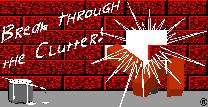At the National Eligibility Workers Conference in Anaheim last week, a woman asked about the subject of my workshops. When told that they were about communicating effectively, she thought for a bit then said, "If you can get people to actually listen, then you can communicate effectively. That's the hard part, nobody listens anymore." She's right. Mignon McLaughlin summed it up very nicely when she said, "Nobody listens to anyone anymore. Try it for a while, and you'll see why."
In this age of blogs, personal web pages, cell phone cameras and more, people really seem to be talking about themselves. In focusing on being a "sender" all of the time, they are losing the ability to be a "receiver".
This is one of the toughest filters you and your message need to overcome in order to reach people today. You can have as little as three seconds to make an impact with your message. That's why it so critical to practice what you learn in your "Break Through the Clutter" Communication Seminar. That's how you can break through all of those other messages, interest your receivers in actually listening to you since you're focusing your message on them, and continue to reach people with your message. It is simple, but it isn't always easy. And it is more critical today than ever before.
Glad I was listening when she made that comment in Anaheim.
Call or E-mail today to schedule a "Break Through the Clutter" Communication Seminar for your group or business, 913-631-2985, bkthrucomm@aol.com.
Tuesday, August 26, 2008
Wednesday, August 13, 2008
The words you choose and use...
One of the anchors for the Olympic television coverage spoke of a team "throwing down the gantlet" in their competition. The word he used is pronounced "GANT-let", rhyming with "can't let". He was correct. Most would say "gauntlet" instead of "gantlet". Each is correct. But, if you say "gantlet", someone is likely to correct your pronunciation.
The same is true if you describe one of the things you do well as being your "fort". Most would instead say "FOUR-tay", and may try to correct your pronunciation. However, in this case, they would be wrong. The French word "fort" means "something that you do well" or "a strong point". The Italian word "forte" instead means "something that you do loudly".
The problem comes from people hearing someone else use a word or phrase that they think makes that person sound intelligent, cool, or knowledgeable. So, they start using the word or phrase themselves. This is how non-words like "irregardless" get into common usage. Someone says it, someone else hears it and starts using it, and it spreads like a virus.
One of the keys to you communicating effectively is to be careful that you don't fall into those traps. Before you start using a new word or phrase, find out what it really means and how it should be correctly used. It may seem trivial and unnecessary, but anything you can do to make it easier for the other person to understand what you're talking about is in your best interests.
Call or E-mail today to schedule a "Break Through the Clutter" Communication Seminar for your group or business, 913-631-2985, bkthrucomm@aol.com.
The same is true if you describe one of the things you do well as being your "fort". Most would instead say "FOUR-tay", and may try to correct your pronunciation. However, in this case, they would be wrong. The French word "fort" means "something that you do well" or "a strong point". The Italian word "forte" instead means "something that you do loudly".
The problem comes from people hearing someone else use a word or phrase that they think makes that person sound intelligent, cool, or knowledgeable. So, they start using the word or phrase themselves. This is how non-words like "irregardless" get into common usage. Someone says it, someone else hears it and starts using it, and it spreads like a virus.
One of the keys to you communicating effectively is to be careful that you don't fall into those traps. Before you start using a new word or phrase, find out what it really means and how it should be correctly used. It may seem trivial and unnecessary, but anything you can do to make it easier for the other person to understand what you're talking about is in your best interests.
Call or E-mail today to schedule a "Break Through the Clutter" Communication Seminar for your group or business, 913-631-2985, bkthrucomm@aol.com.
Subscribe to:
Posts (Atom)
